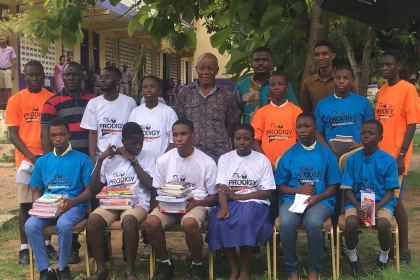When a congratulatory email appears in a young Ghanaian’s inbox, it often comes from an institution located thousands of kilometers away. Often, such messages come with offers that local awards seldom give – stipends, conference access and structured mentorship.
For top students weighing next steps, such emails read less like invitations and more like ready-made career plans, complete with laboratories, networks and internships. Each acceptance strengthens the gravitational pull of global institutions and underscores the widening gap in how talent is funded, guided, and retained at home.
For many students, that level of structure and support is precisely what is missing at home. Interviews with applicants, lecturers and education advocates point to a familiar bottleneck: few domestic awards, many contenders.
Ghana’s most visible public and private scholarships are heavily oversubscribed, coupled with narrow subject coverage, while awards also focus on tuition without research or living stipends, limiting access for lower-income candidates.
Again, there is the challenge of opaque and uneven processes as applicants describe short application windows, changing requirements and limited feedback. Without clear timelines and mentorship, strong candidates look outward.
There is also the issue of thin research funding. Laboratories, journals, fieldwork and conference travel are rarely bundled with local awards, making it difficult to build a competitive academic record without outside support. Corporate and foundation-backed fellowships, common abroad in humanities, engineering, health sciences and agri-tech, remain underdeveloped in Ghana.
Juliana Somuah fits into this context. She is a Ph.D. student in Infrastructure and Environmental Systems at the University of North Carolina Charlotte, United States of America, focusing on facility management, leadership training and sustainable methods across the built environment. With an eye on global infrastructure and workforce needs, her research bridges the technical and human sides of construction and facility engineering.
Somuah, a promising student, recently received one of those emails, as usual, not from a Ghanaian institution, a congratulatory letter that is both a source of national pride and a stark reminder of a persistent national challenge.
She was awarded the 2024 Buck Fisher Greater Triangle Scholarship by the International Facility Management Association, (IFMA) Foundation in the United States, an honor recognising her exceptional academic achievements, strong leadership, and interpersonal skills.
The award includes an all-expenses-paid trip to the IFMA World Workplace Conference in San Antonio, Texas—the largest facility management conference in the world. This is a life-changing opportunity for Ms. Somuah, a chance to network with global leaders and sharpen her skills.
At IFMA, Somuah is contributing to high-visibility studies: “Insights into the Personalities of Facility Managers: The People Behind the Facilities,” “Global Trends in Facility Management,” the ongoing “Blueprints of Behavior: How Top Facility Managers Lead, Collaborate and Innovate,” “Return-to-Office Strategies,” “Amenities Report,” and the NAICS Classification Feasibility and Verification Study for benchmarking FM operations.
Since these projects feed directly into IFMA’s global benchmarking and strategic planning, the findings are already influencing how large portfolios are run and providing accurate classifications for FM professionals — not years from now, but today.
For Ghana, the portability is obvious! Ministries, Metropolitan, Municipal and District Assemblies (MMDAs), teaching hospitals, universities, malls, factories and logistics hubs face the same challenges: aging assets, rising energy costs, skills gaps, and tight budgets.
Benchmarking gives facilities directors a way to compare uptime, maintenance backlog, cost per square meter and staffing ratios against international ranges, then set realistic improvement targets. The NAICS-aligned approach also makes it easier for local service firms to bid on multinational contracts, because they can report performance in the language global clients expect.
Somuah’s current brief—an AI-driven initiative within IFMA Engage—speaks to the future of the FM profession. By using AI to automate insight generation, surface look-alike portfolio problems and deliver personalized learning to practitioners, the work promises to shrink the gap between best practice and everyday practice.
For Ghana, where training budgets are thin, this feels discounted. An FM at a regional hospital in Tamale should be able to pull, in minutes, a digest of maintenance regimes used by similar hospitals, the likely failure modes of their chillers, and a bite-sized course to upskill the maintenance team—without waiting for an annual workshop in Accra. AI-driven communities of practice make that plausible.
The reality is that opportunities like the one Somuah earned are exceedingly rare within Ghana. While our students consistently demonstrate world-class intellect and drive, the local ecosystem of support struggles to keep up. Both government and corporate funding for higher education fellowships and scholarships remain critically insufficient.
We have a massive pool of talent, but the well of opportunity is shallow, as our universities are underfunded, and the private sector has not yet fully embraced a philanthropic culture of sponsoring specialized, merit-based academic pursuits.
A student in Ghana has a much harder time finding local funding for postgraduate studies than their counterpart in Europe or North America. This forces our most ambitious students to look outward.
They spend countless hours navigating the complex application processes for foreign universities and foundations, which have vast endowments and a long history of attracting global talent. Institutions like the IFMA Foundation have the resources to not only provide financial aid but also to offer invaluable career-building experiences, such as the World Workplace conference.
The immediate consequence is brain drain – the steady emigration of highly skilled graduates. After excelling abroad, many faces compelling reasons not to return; competitive salaries, access to cutting-edge technology, reliable funding and clear career ladders. Host countries offer stability and faster growth in specialised fields.
Somuah earned her first degree in Ghana; yet, as her career advances through U.S. programmes, she will be described as “American-trained.” The label reflects an investment Ghana helped start but has not fully captured.
To change the equation, industry and philanthropy must step up alongside government and universities: expand Ghana-based fellowships with full stipends and research support, fund research-to-practice labs tied to local projects and create return grants and mentorship pipelines.
When local awards cover living costs, equipment and conference travel—and when career paths are visible, our brightest can build their futures here, and the nation will share in the dividends.
GNA






